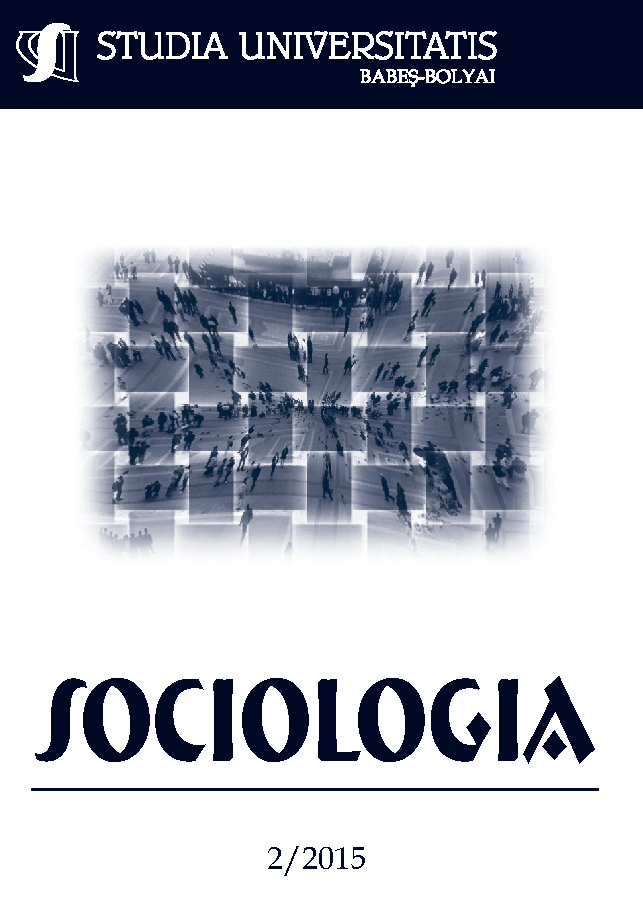BOOK REVIEW. ‟DEPENDENŢĂ ȘI DEZVOLTARE. ECONOMIA POLITICĂ A CAPITALISMULUI ROMÂNESC” [DEPENDENCY AND DEVELOPMENT. THE POLITICAL ECONOMY OF ROMANIAN CAPITALISM] BY CORNEL BAN. CLUJ-NAPOCA: TACT PUBLISHING HOUSE, 2014, 293 P.
Abstract
Cornel Ban’s Dependency and development. The political economy of Romanian capitalism is a contribution both to the sociology of development and heterodox economics. Romanian modern economic history unfolds in eight chapters covering the period from the dawn of the local capitalist state, in mid-19th century, to the contemporary state policies, in the aftermath of the 2008 Great Depression. The reader is invited to follow the institutional complementarities and contradictions that emerged in the region and in Romania in relation to policies regarding financing, investment, industrial development, international trade and the labour market. The decisions taken in these various economic spheres are shown to be connected, producing consistent policy regimes. The attention to history makes visible successive economic decisions, in a twofold way: as species of the various Central and Eastern European attempts to escape the peripheral status in the capitalist world system and as strategies that have continuities, effects and are subject to reinterpretation across historical epochs.
References
Amsden, A. H. (1992). Asia’s Next Giant: South Korea and Late Industrialization. New York and Oxford: Oxford University Press.
Anderson, P. (2013a). Consilium. New Left Review, 83(sept.-oct.).
Anderson, P. (2013b). Imperium. New Left Review, 83(sept.-oct.).
Ban, C. (2015). Beyond Anticommunism The Fragility of Class Analysis in Romania. East European Politics and Societies, 29(3): 640-650.
Bockman, J. (2011). Markets in the Name of Socialism: The Left-Wing Origins of Neoliberalism. Stanford: Stanford University Press.
Bockman, J., and Eyal, G. (2002). Eastern Europe as a Labouratory for Economic Knowledge: The Transnational Roots of Neoliberalism1. American Journal of Sociology, 108(2): 310-352.
Bohle, D., and Greskovits, B. (2012). Capitalist Diversity on Europe’s Periphery. Itacha and London: Cornell University Press.
Brenner, R. (2006). An Alternative Approach to the Long Downturn The Economics of Global Turbulence: the Advanced Capitalist Economies from Long Boom to Long Downturn, 1945-2005. London: Verso, pp. 27-40.
Burawoy, M. (2001). Neoclassical Sociology: From the End of Communism to the End of Classes. American Journal of Sociology, 106(4): 1099–1120.
Callon, M., and Muniesa, F. (2005). Peripheral vision economic markets as calculative collective devices. Organization studies, 26(8): 1229-1250.
Chibber, V. (2003). Locked in Place: State-building and Late Industrialization in India. Princeton and Oxford: Princeton University Press.
Cucu, A.-S. (2014). Producing knowledge in productive spaces: ethnography and planning in early socialist Romania. Economy and Society, 43(2): 211-232.
Cucu, A.-S., and Culic, I. (2012). Procese de configurare a claselor sociale în România. O analiză relaţională a căsătoriilor pentru cinci generaţii [Processes of social class configuration in Romania: a correspondence analysis of marriages across five generations]. In T. Rotariu and V. Voineagu (Eds.), Inerţie şi schimbare. Dimensiuni sociale ale tranziţiei în România [Inertia and change. Social dimensions of transition in Romania]. Iaşi: Polirom, pp. 159-170.
Culic, I. (2002). Câștigătorii: elita politică și democratizare în România 1989-2000. Cluj: Limes.
Culic, I. (2006). From amateur revolutionaries to professional politicians: the Transformation of the romanian political elite, 1990-2004. International Journal of Sociology, 36(1): 69-92.
Evans, P. B. (1995). Embedded Autonomy: States and Industrial Transformation (Vol. 25). Princeton: Princeton University Press.
Eyal, G., Szelényi, I., and Townsley, E. (1998). Making Capitalism without Capitalists: Class Formation and Elite Struggles in Post-Communist Central Europe. London: Verso.
Eyal, G., Szelényi, I., and Townsley, E. (2001). The Utopia of Postsocialist Theory and the Ironic View of History in Neoclassical Sociology. American Journal of Sociology, 106(4): 1121–1128.
Hall, P. A., and Soskics, D. (2001). Varieties of Capitalism. The Institutional Foundations of Comparative Advantage. Oxford and New York: Oxford University Press.
Hancké, B., Rhodes, M., and Thatcher, M. (2009). Beyond Varieties of Capitalism. Conflict, Contradictions, and Complementarities in European Economy. Oxford and New York: Oxford University Press.
Kocka, J. (1995). The middle classes in Europe. The Journal of Modern History, 67(4): 783-806.
Kohli, A. (2004). State-Directed Development: Political Power and Industrialization in the Global Periphery. Cambridge: Cambridge University Press.
Latour, B. (1993). We Have Never Been Modern. Cambridge: Harvard University Press.
Latour, B. (2005). Reassembling the Social: An Introduction to Actor-Network-Theory Oxford and New York: Oxford University Press.
Love, J. L. (1996). Crafting the Third World: Theorizing Underdevelopment in Rumania and Brazil. Stanford Stanford University Press.
MacKenzie, D. A., Muniesa, F., and Siu, L. (2007). Do Economists Make Markets? On the Performativity of Economics. Princeton and Woodstock: Princeton University Press.
Muniesa, F., Millo, Y., and Callon, M. (2007). An introduction to market devices. The sociological review, 55(2): 1-12.
Nölke, A., and Vliegenthart, A. (2009). Enlarging the varieties of capitalism: The emergence of dependent market economies in East Central Europe. World Politics, 61(04): 670-702.
Pasti, V. (1997). The Challenges of Transition: Romania in Transition. Boulder: East European Monographs.
Petrovici, N. (2006). Relaţii de putere în cadrul elitei politice româneşti la sfârşitul anilor ‘80 şi începutul anilor ‘90 [Power relations within the Romanian political elite at the end of the 1980s and the beginning of the 1990s]. Sociologie Romaneasca, IV(1): 119-145.
Poenaru, F. (2011). Care e problema cu PSD-ul? [What’s the problem with PSD?]. Critic Atact, 15.11.2011, http://www.criticatac.ro/11683/care-e-problema-cu-psd-ul, (20.11.2011).
Stark, D., and Bruszt, L. (1998). Postsocialist Pathways: Transforming Politics and Property in East Central Europe. Cambridge and New York: Cambridge University Press.
Williams, M. (2014). The End of the Developmental State? New York and Oxon: Routledge.
Woo-Cumings, M. (Ed.). (1999). The Developmental State. Ithaca and London: Cornell University Press.
Zamfir, C. (2004). O analiză critică a tranziției: ce va fi "după" [A critical analysis of transition: what is going to be "after"]. Iași: Polirom.
Downloads
Published
How to Cite
Issue
Section
License
Copyright (c) 2015 Studia Universitatis Babeș-Bolyai Sociologia

This work is licensed under a Creative Commons Attribution-NonCommercial-NoDerivatives 4.0 International License.



